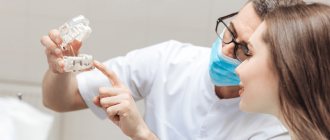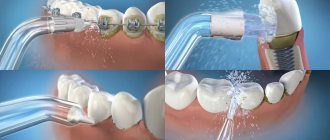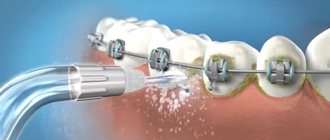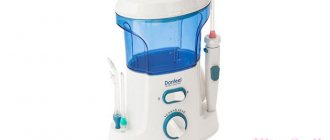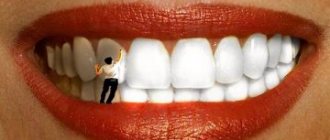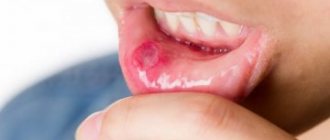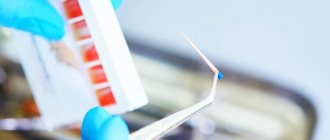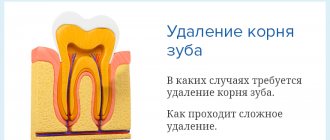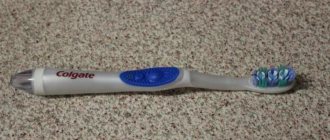What is an irrigator
An irrigator is a device for cleansing the oral cavity of contaminants, i.e., soft plaque and microscopic food debris. An ordinary toothbrush cannot always cope with the task and, as a result, the interdental spaces and gum pockets are first covered with a soft coating, then mineralized, forming tartar. Poor hygiene inevitably leads to gum inflammation (gingivitis, periodontitis), caries and, of course, deterioration in the aesthetics of a smile. The irrigator can solve the problem of insufficient hygienic care. It looks like an electric toothbrush, but instead of bristles there is a tip attachment from which liquid is sprayed under pressure. The pressure can be adjusted depending on the type of cleansing and the sensitivity of the patient.
Note: an irrigator is not an alternative to a toothbrush and toothpaste; this device is an additional device for keeping the oral cavity clean.
Advantages of use:
- ideal cleaning of teeth, gums, tongue → no unpleasant odor, beautiful smile;
- treatment of periodontal pockets → healthy gums;
- cleaning of crowns, veneers, braces, implants → professional plaque removal;
- performing gum massage → strengthening gum tissue, reducing bleeding.
Rating of the best liquids for irrigators
Irix
The popular product in the form of a concentrate for oral hygiene has a packaging capacity of 300 ml. To use in an irrigator, Irix should be diluted with water in a ratio of 1:10. When used independently as a rinse aid, it does not require mixing with water.
The series includes:
- Irix F with sodium fluoride to reduce the reaction of teeth to changes in temperature, changes in acidity and restoration of enamel, in particular, after the whitening procedure;
- Irix with menthol.
Irix
Advantages:
- Russian manufacturer;
- lack of fluorine in the composition;
- complex purpose;
- does not contain alcohol;
- does not contain preservatives;
- high efficiency for teeth with increased sensitivity;
- reduction of bleeding gums;
- antiseptic;
- protection against plaque formation;
- sanitation of interdental spaces;
- powerful preventive effect;
- protection against caries;
- prevention of diseases with a local source in the periodontal pocket;
- made from benzyldimethyl, potassium citrate, ammonium chloride, potassium alum, fragrance;
- no foam formation during use;
- two-year shelf life;
- does not contain preservatives.
Flaws:
- According to certification, it belongs to the type of means for diagnosing the state of hygiene.
GladCor
Waterdent rinse in the form of a concentrate for oral hygiene belongs to the budget group, has a packaging capacity of 500 ml
The series includes:
- GladCor with chamomile and sage for strengthening;
- GladCor with chamomile and sage, without fluoride, with a refreshing effect;
- mint GladCor;
- the active contains Ancient Sea salt and zinc lactate;
- antibacterial;
- mint plus chlorhexidine for the prevention of caries and gum disease;
- refreshing GladKor contains salt of the Ancient Sea and a set of medicinal herbs;
- phytocomplex rinse containing fluoride;
- the strengthening concentrate contains Ancient Sea salt; minerals for use should be diluted with water in a ratio of 1:5.
There is a single marking at the top of the cylinder for all types.
GladCor Waterdent
Advantages:
- wide range of preventive effects;
- strengthening enamel;
- taking care of problem gums;
- for daily care;
- diverse range of variations;
- natural ingredients;
- no foam formation during use;
- convenient packaging.
Flaws:
- has no medicinal effects.
Donfeel
Premium class balm for prevention and daily care.
The series includes:
- solution for bleeding gums, does not contain fluoride, with an antibacterial effect, to give fresh breath;
- balm with complex protection based on herbs;
- balm that strengthens enamel with an antibacterial effect based on extracts of chamomile, sage, lemon balm, and nettle;
- mint-lime balm for comprehensive care with an antibacterial effect and enamel protection;
- a refreshing balm with tangerine aroma to care for enamel, remineralize it, and prevent plaque formation;
- balm for sensitivity of gums and teeth, with berry aroma, strengthens enamel, forming a protective film, does not contain fluoride;
- balm for sensitive gums and teeth, with raspberry aroma.
A company with a motto of doing extraordinary things.
Donfeel balm
Advantages:
- for everyday care;
- prevention of gum and dental diseases;
- strengthening enamel;
- creation of a protective film;
- wide range of aromas;
- freshness of breath;
- does not contain fluorine;
- uses a 2 in 1 formula;
- used for the irrigator of the same name.
Flaws:
- not detected.
Albadent
The liquid in the form of a concentrate for oral hygiene has a packaging capacity of 400 ml. For use in an irrigator, it should be diluted with water in a ratio of 1:10. When used independently as a rinse aid, it does not require mixing with water. The product actively cleanses the oral cavity, prevents inflammation and the development of caries, and contains ginseng and medicinal herbs.
The series is represented by the following preventive and cleansing products:
- strengthening balm with enhanced mineral nutrition;
- balm with Altai mumiyo for the prevention of periodontal diseases;
- therapeutic and prophylactic balm for smokers with the effect of eliminating coffee deposits and the smell of nicotine;
- balm with propolis, sage and triclosan to prevent inflammation, improve the condition of the gums and oral mucosa, and fresh breath;
- strengthening balm with Dead Sea minerals for strengthening, cleansing, enhanced mineral nutrition, gives freshness to breath;
- anti-caries balm prevents disease, deodorizes the oral cavity, contains fluoride and calcium ions, and has a healing effect;
- anti-inflammatory balm for the prevention of periodontal diseases with a bioantioxidant complex of ginseng, to reduce swelling of the gums, treat bleeding, eliminate burning and inflammation;
- balm based on medicinal herbs with sage, calendula, chamomile, St. John's wort for complex prevention, protection of the oral mucosa from inflammation, removal of plaque, elimination of bad breath;
- balm to protect against tartar formation, eliminate plaque, prevent caries and inflammation, and ensure fresh breath.
Albadent
Advantages:
- protection against caries;
- anti-stone protection;
- relieving gum swelling;
- anti-inflammatory effect;
- content of natural ingredients;
- anti-oxidant effect;
- with a high content of ions;
- protection against periodontal disease;
- antiseptic effect;
- for fresh breath.
Flaws:
- After using mint balm, your tongue may tingle.
Asepta
Anti-inflammatory solution with the effect of protection against caries and tartar, promotes fresh breath. The product is packaged in 250 ml containers.
The series includes a comprehensive set for healthy gums with an active effect against periodontitis and gingivitis with a 2 in 1 formula:
- adhesive balm;
- rinse aid.
The product has an organic base, has a pronounced antibacterial effect, and is indicated for use in cases of tooth sensitivity.
Asepta
Advantages:
- does not contain dyes, antiseptics, ethyl alcohol;
- maximum effect in a short time;
- contains extracts of chamomile, sage, mint, castor oil (hydrogenated)
- economical consumption when mixed with water in a ratio of 1/10;
- the solution is effective for cleaning hard-to-reach places;
- does not contain fluorine;
- for people with dental structures;
- reduction and prevention of bleeding;
- Helps tighten gum pockets.
Flaws:
- There are no recommendations for removing coffee stains.
Rocks
ROCS are remineralizing oral care systems, which are represented by a wide range of products, including liquid for irrigator.
The product is intended for:
- restoration of mineral saturation of teeth;
- reducing the risks of inflammation;
- strengthening gums and teeth.
Belongs to the professional class.
Rox liquid for irrigator
Advantages:
- based on kelp extract to relieve inflammation;
- saturation with minerals occurs due to calcium, magnesium, phosphorus;
- anti-caries protection based on xylitol;
- no foam formation during use;
- high efficiency in treating interdental spaces and removing plaque
- does not contain fluorine;
- with a strong antibacterial effect;
- helps strengthen enamel;
- gives freshness to breath.
Flaws:
- delayed whitening effect.
Professor Persin
The Russian-made liquid with an anti-inflammatory effect is packaged in 500 ml bottles and consists of a unique composition of herbs.
The product has the following effects:
- astringent;
- hemostatic;
- anti-inflammatory;
- healing;
- painkillers;
- antifungal.
The liquid contains mint and chamomile flower extract, sage, myrrh, cremeria root, and Echinacea purpurea.
Professor Persin liquid for irrigator
Advantages:
- improvement of blood circulation and soft tissue tone due to mint content;
- stimulation of protective functions;
- the presence of echinacea ensures rapid wound healing and strengthens the immune system;
- the regeneration effect is achieved with myrrh extract;
- chamomile flowers soothe the mucous membrane and have a positive effect on metabolism;
- sage leaves relieve pain and tone;
- plant oils form the basis of biosol, which destroys microbes, reduces allergies, and plays the role of an antiseptic;
- convenient volume for long-term use;
- reasonable price.
Flaws:
- No.
Forest balm
A balm with a rich pine taste stimulates immune defense, protecting gums from diseases. The composition includes fir, juniper extract, and resin. When used in an irrigator, dilute with water in a ratio of 1:3.
Forest balm rinse
Advantages:
- strengthening the vascular system of the gums;
- improved blood circulation;
- recommended for diagnoses of gingivitis, periodontitis;
- slows down plaque growth;
- the composition includes a decoction of five herbs, aloe juice;
- oak bark provides an astringent effect and strengthens soft tissues;
- inhibits staining of enamel with coffee and tea dyes;
- natural whiteness of teeth;
- there are no restrictions on use for pregnant women;
- no foam formation during use;
- promotes fresh breath.
Flaws:
- not found.
Revyline
Oral balm against gum inflammation, for fresh breath, reducing bleeding. The product is packaged in 400 ml, has a long shelf life.
Revyline mouth balm
Advantages:
- with natural components of sage, propolis, triclosan - a therapeutic effect with suppression of the activity of pathogenic flora, cleansing periodontal pockets;
- with mint flavor to strengthen enamel and whiten;
- according to buyers, it radically changes the condition of the oral cavity;
- acceptable price;
- recommended for use in the irrigator of the same name;
- in the form of a concentrate for irrigator, it does not contain fluorine and chlorhexidine, it contains neovitin as an antioxidant component;
- relieves swelling of the gums;
- indicated for painful inflammation;
- effective blocker of bleeding;
- in the form of a concentrate, recommended for people diagnosed with periodontitis, gingivitis, periodontal disease, made on the basis of chamomile flowers, with St. John's wort, calendula, sage;
- destroys not only pathogenic microflora, but also eliminates the favorable reproduction zone;
- elimination of odors, fresh breath;
- an effective means of prevention.
Flaws:
- not detected.
Irrigator cleaner
The liquid is intended to increase the service life of the device, to cleanse limescale deposits that impede the engine's running and promote the development of bacterial microflora.
Operating principle
The essence of the principle of operation of the irrigator is quite simple: liquid (water or solution) is poured into a special container of the device, the compressor creates pressure, and when you press the button, a stream escapes from the tip. Getting on the teeth, gums, tongue, palate, it “knocks down” microparticles adhering to the mucous membrane and washes them away. The person can only spit out the waste liquid.
Important: the liquid in the device is supplied under pressure, so people who have any acute inflammation of the mucous membranes of the gums, tongue, cheeks and lips are not recommended to use the irrigator for a hygienic procedure.
How to use it correctly
Regardless of the type of liquid, the rules for its use should be strictly followed:
- If you use household products, you should carefully study their operating instructions.
- Do not use the liquid if there are contraindications and there are no indications for use.
- The use of homemade solutions is permissible after complete dissolution of all components in them and filtration of herbal decoctions.
- Most of these liquids are presented in the form of concentrates, requiring their preliminary dilution in a ratio of 1:10.
- To prepare liquids, you must use only purified, distilled or boiled water.
- The water temperature should not be more than 38 degrees.
- The most appropriate time for irrigation is the evening after brushing your teeth.
- The liquid is directed to the gums at an angle of 80 degrees, and the duration of the procedure should not exceed 15 minutes.
- The frequency of use of a particular liquid is determined taking into account its type and purpose.
Varieties
In order to satisfy the needs of device users, irrigators are produced in various configurations, with different specialized attachments. Irrigators are either stationary or portable. The stationary one can be installed in the bathroom, and the portable one can be taken with you on vacation or a business trip. There are models with the ability to adjust the mode and additional options, for example, with the generation of small bubbles for a softer and more effective cleansing. Some models of irrigators can be connected to a water supply, others operate from a built-in reservoir.
Types of irrigators
Basically, devices are divided into two types:
- stationary, which require power from an outlet;
- portable ones that use batteries.
Stationary irrigators are used at home. This irrigator comes with a large set of replaceable attachments and can be used by all family members. It is more powerful than a portable one, is easy to disassemble and clean, and has wide possibilities for selecting operating pressure.
Portable models are used for travel. They also have to be used in cases where it is not possible to connect a stationary device in the bathroom. Such devices are for individual use, more compact and lighter, but not as effective as stationary ones.
How often should you apply
As already mentioned, using an irrigator is an additional method of hygienic care. The frequency of operation depends on the individual characteristics of the user and the intended purpose:
- to prevent the formation of tartar - 1 time per day, every other day;
- to remove smoker's plaque (as well as with excessive consumption of black tea, coffee and red wine) - daily;
- during pregnancy - daily;
- for problems with gums (gingivitis, periodontitis, periodontal disease) - the frequency of use must be checked with your doctor;
- when wearing braces or installed dentures - twice a day (it is recommended to clean braces after every meal).
Specialist clarification: if you have undergone surgery in the oral cavity (tooth extraction, gum recession, implantation, etc.), then the use of an irrigator is possible only with the permission of the surgeon.
Nozzles for irrigators
In addition to the standard nozzles that come with the irrigator, you can purchase additional ones - regular and special. These can be attachments for sensitive gums, for massaging the gums and removing plaque, for cleaning crowns, dentures, there are even attachments for cleaning the nasopharynx.
Therefore, the name of the nozzles indicates for what purposes they are intended. The following attachments are available for sale:
- Standard;
- For whitening and polishing teeth;
- Periodontal;
- Orthodontic;
- Tongue cleaning attachments;
- Nasal - for cleaning the nasopharynx;
- Brush attachments - for complex irrigation and toothbrush cleaning.
They are produced for a specific model, and manufacturers try to provide the entire line of existing types.
How to care for the device and choose liquid
The length of its service life depends on compliance with the rules of care of the irrigator. It must be stored in a dry place. After use, it is necessary to clean, especially when using herbal infusions. How to do this: fill the tank halfway with boiled water (or bottled drinking water), drain it. Then thoroughly rinse the attachments that have been used and dry them with a towel. The best option is to purchase a model with the option of disinfecting the nozzles with ultraviolet light. This guarantees absolute hygienic safety and time-saving care.
Attention! The irrigator is an electrical device, so under no circumstances should you put it in water, as this can result in electrical injury (electric shock) and damage to the device.
What can be used as a working fluid:
- boiled or bottled water;
- water with the addition of balm intended specifically for irrigators;
- decoction of herbs (subject to preliminary thorough filtration).
The network of dental clinics “Smile” offers services for the prevention of dental and periodontal diseases. Our specialists will carry out professional cleaning and advise you on how to use an oral irrigator. For the convenience of patients, we have a system of family and cumulative discounts.
You can contact any of the branches of our clinic in Moscow, located within walking distance from the metro:
- Art. Alekseevskaya (VDNKh district, etc. Mira), address: st. 3rd Mytishchiskaya house 3, building 2;
- Art. Shelepikha, address: Shelepikhinskaya embankment, address: building 34, building 1.
Prevention is the best protection against disease, don’t forget about it. Come to us for professional prevention and receive recommendations for home hygiene care. We are waiting for you every day!
Device, principle of operation and purpose
The name of the device translated from Latin means a device for irrigation.
Using a strong jet of water mixed with air bubbles, the irrigator removes soft plaque from the enamel, food debris stuck between the teeth, and massages the gums. The device does not replace brushing your teeth, but complements it. How does an irrigator work? This is an electrical device that runs on mains or batteries. Consists of the following parts:
- handles;
- water container;
- shower heads.
One of the most common irrigator form factors
The device is equipped with an electric motor and a compressor that creates the necessary fluid pressure. When turned on, water is mixed with air and forcefully thrown out through the shower head.
Revyline concentrate for irrigator
Rinse aid with a high concentration of active ingredients. The concentrate is not used for rinsing in its pure form. To do this, you need to fill the glass cap 1/3 with concentrate, and then add water to the top mark. The solution for the irrigator is prepared from one part of the concentrate and 10 parts of water.
The concentrate contains two highly effective natural components: the bioantioxidant complex Neovitin-M and the bioflavolipid complex Activitin. Due to the high biochemical activity of these ingredients, there is a beneficial effect on the condition of the gums - inflammation and bleeding are reduced. Having a high disinfecting ability, the concentrate prevents the development of bacteria and plaque formation.
Ingredients: Purified water, propylene glycol, PEG-40 hydrogenated castor oil, bioantioxidant complex Neovitin-M, bioflavolipid complex Activitin, xylitol, flavorings, methylparaben, ethylparaben, essential oil, grapefruit, DMDM hydantoin, saccharin, limonene.
Why do you need an irrigator?
Irrigator is a derivative of the Latin word irrigatum, which means “to irrigate.” This is a device that allows you to use water to clean your teeth from organic residues remaining in the mouth after eating. The irrigator does not replace the action of a toothbrush. An irrigator is especially necessary when wearing orthopedic devices (bridges, brackets, brackets and others). With its help, structural elements and the surface of the teeth that come into contact with them are cleaned.
Why do you need an irrigator and how does it work?
An irrigator is essentially a device that treats the oral cavity using a focused jet of water supplied under high pressure. The enhancing effect is the pulsating mode of liquid supply. As a result of this treatment, full-scale removal of contaminants occurs both from the surface of the teeth and gums, and from the interdental spaces.
In connection with the popularization of irrigators, consumers have a number of questions, the most pressing of which are: how to properly use an irrigator for cleaning teeth and how often can you use a dental irrigator ?
At what age can children use an irrigator? In order to answer these and many other questions related to the use of this relatively new device for us, it is necessary to consider in more detail some of the nuances.
Contraindications to using an irrigator
There are literally no such contraindications. There are some restrictions on the use of this device.
Limitations of using the irrigator:
- Children under six years of age;
- Excessively developed gag reflex;
- Diseases of the oral cavity during exacerbation;
- Postoperative conditions;
- A history of serious neurological and cardiovascular diseases;
- increased sensitivity of teeth and bleeding gums.
Misconceptions
❌ An irrigator can replace a toothbrush
Using a toothbrush is essential for quality oral care. An irrigator is an additional hygiene product; it can replace dental floss, but not a brush with toothpaste.
❌ It is enough to use the irrigator a couple of times a week
The irrigator should be used every time after brushing your teeth, that is, in the morning and in the evening.
❌ You definitely need to use balms for irrigators
You can use an irrigator with regular warm water. It must be filtered or boiled. Irrigator balms help fight some diseases, but their use is not necessary.
❌ You can pour herbal decoctions and regular rinses into the irrigator
Only water and special balms can be poured into the irrigator. Mouthwashes foam heavily in the reservoir, and herbal infusions leave a sediment. All this can quickly break the device.
❌ The fluid supply hose must be long
The hose should not be too long, as you will still have to bend over the sink when using the irrigator. There is no point in using the device while standing.
❌The more power levels the irrigator has, the better it is
Modern irrigators have smooth power adjustment, and the number of divisions on the toggle switch is quite arbitrary.
Benefits of an irrigator
The benefit of the irrigator is better cleaning of the oral mucosa, surface of the teeth, interdental spaces, as well as orthopedic structures. And the absence of a biological substrate for the proliferation of bacteria and the rotting of food debris is the prevention of the development of dental diseases. Medical studies have found that a three-second treatment with pulsating water using an oral irrigator removes up to 99.9% of bioplaque on teeth.
Oral irrigator features:
- Significantly reduces the risk of developing caries.
- Promotes rapid healing of gums through micromassage.
- Disinfects and refreshes the oral cavity with antiseptic solutions.
- Cleans gum pockets and prevents the development of periodontal disease.
- Treats the oral mucosa with medicinal solutions for stomatitis
- Prevents the deposition of pigment on the surface of tooth enamel when smoking, drinking strong coffee, tea, red wine.
- Removes plaque from the mucous membrane of the tongue and gums, which reduces bacterial contamination of the oral cavity.
- Prevents destruction of the enamel coating of teeth when installing braces, braces and other orthopedic devices.
- To reduce trauma to soft tissues due to bleeding and loosening of the gums, replace the toothbrush.
How to use an irrigator: step-by-step instructions
The essence of the action of irrigators is mostly identical. Below are detailed instructions on how to use the irrigator :
- It is necessary to consult a dentist to select the optimal mode of operation of the irrigator, the type of nozzle and the liquid used.
- It is advisable to use an irrigator after using a toothbrush and dental floss.
- You need to choose the most suitable mode. Experts usually recommend starting to get acquainted with the device with minimal power, gradually increasing it as you get used to it. On average, the adaptation period lasts about 7 days.
- The nozzle of the nozzle is directed so that the supplied jet is perpendicular to the surface of the teeth and gums.
- Each dental unit is treated on all sides and adjacent areas of the gums.
- If a special liquid was used that included additional additives, the mouth must be rinsed with water immediately after completing the procedure.
Additional recommendations for using the irrigator:
- The optimal time to use the irrigator is in the evening;
- The average time required for high-quality cleaning of the entire oral cavity is about 10 minutes;
- People with prosthetic structures are advised to use an irrigator after each meal;
- It is not recommended to use an irrigator immediately after flossing (if the gums have been injured by it.) This is due to the risk of additional injury to the gums;
- During the procedure, the tongue is pressed against the upper palate to prevent fluid from entering the respiratory tract;
- Processing is carried out smoothly, avoiding sudden movements. If unpleasant sensations occur, the power of the jet is reduced.
Indications for use of the irrigator
- Prevention of caries. Due to the fact that the effect of the irrigator extends to the most inaccessible areas of the oral cavity, it becomes a good prevention of many dental diseases, the main and most common of which is caries. The irrigator is able to clean both the surface of the front teeth and wisdom teeth, which are the most inaccessible, and therefore are recognized as the most vulnerable dental units;
- Prevention of gum disease. A focused and dense stream supplied by the irrigator has a massaging effect on the surface of the gums, which in turn serves as a good prevention of many diseases, including bleeding;
- Care of implantation, prosthetics and braces systems. The irrigator is capable of efficiently and quickly processing both the surface of prosthetic elements and the cavities hidden behind them;
- Prevention of gingivitis. A massaging jet of water stimulates and restores impaired blood supply to soft tissues. This procedure is most relevant for pregnant women who have the greatest tendency to develop this disease;
- Prevention of unpleasant odor. The irrigator efficiently washes away food debris, which is a source of unpleasant odor, even from the most inaccessible areas of the oral cavity;
- A history of nasopharyngeal diseases. This direction is an additional option and requires special nozzles suitable for rinsing the nasal passages. Such treatment is carried out only on the recommendation of an otolaryngologist.
Revyline whitening rinse
A unique product that increases the brightness and whiteness of enamel. The carbamide peroxide contained in the composition whitens teeth and prevents the formation of bacterial plaque and stone. Hydroxyethylcellulose prevents tooth enamel from thinning.
Revyline Whitening Rinse can be used as a mouthwash as is. The solution for the irrigator is one part rinse aid and five parts water.
Ingredients: Purified water, methylparaben, ethylparaben, propylene glycol, PEG-40 hydrogenated castor oil, xylitol, urea peroxide, tris-(hydroxymethyl)-aminomethane, flavorings, hydroxyethylcellulose, citric acid, peppermint essential oil, sodium saccharin, methyldiisopropylpropionamide.
How to use an irrigator: summary
If you follow all the rules and recommendations, the irrigator can become an indispensable hygiene product for the whole family. Its massaging and washing properties can help, if not eradicate, then minimize many problems associated with the condition of the oral cavity.
In this article, we tried to answer your question: how to properly use an irrigator to clean your teeth and mouth . In order for the use of an irrigator to bring maximum benefit, it would be advisable to consult a dentist.
Which dental irrigator to choose
Basically, irrigators are divided into 2 types: stationary and mobile. Stationary irrigators have a large capacity for liquid (about 1000 ml), operate from the mains and their main distinguishing feature is high power. Mobile (portable) irrigators are light in weight, the volume of liquid is almost 2 times less than that of stationary ones (400-500 ml) and operate on batteries.
If you plan to mainly use the irrigator at home, then it is certainly better to buy a stationary irrigator, since you do not need to buy batteries for it, and the large volume of the liquid reservoir is enough for several uses, or for use by two people.
If you travel often, it is better to take a portable irrigator model, since it takes up little space and does not require an outlet to operate.
What liquid to pour into the irrigator
To refill the device, liquids are used, which, depending on the composition, have one or another effect.
Main types of compositions:
- Fluoridating. Aimed at strengthening tooth enamel;
- Therapeutic and prophylactic. Contain antiseptic additives, mostly of plant origin;
- Refreshing. The composition of such liquids includes menthol and eucalyptus, which help freshen breath;
- Antiperiodontal. Contains various biooxidants and anti-caries components;
- Hypoallergenic. They have a neutral composition, suitable for people prone to allergic reactions.
